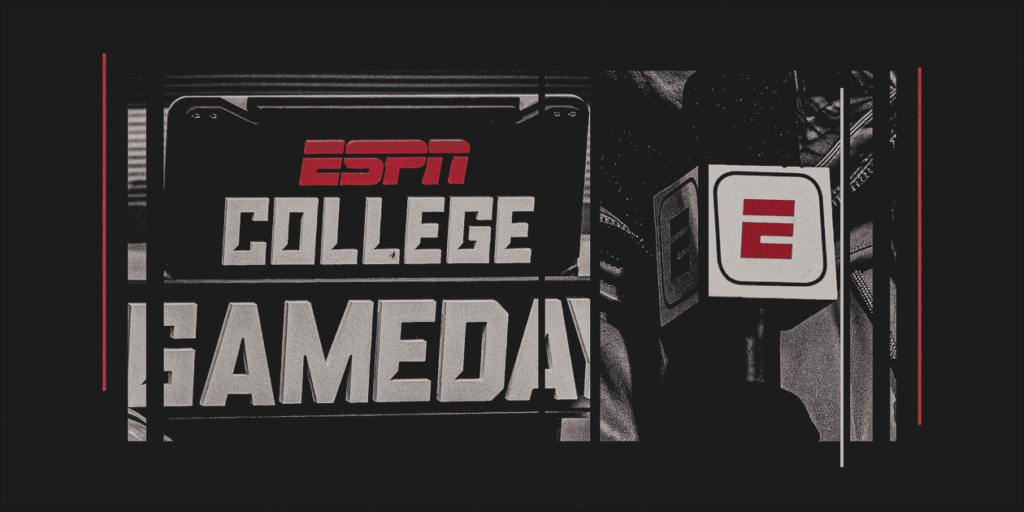In a sudden and seismic shift within the hallowed halls of ESPN, a memo dispatched by Norby Williamson, a venerable figure in the broadcasting realm, delivered shocking news: Lee Fitting, a titan of the network’s production department for over two decades, was “no longer with the company.” The terse announcement sent ripples of disbelief across ESPN’s Bristol headquarters, especially as it unfolded in the shadow of the impending college football season, igniting conversations steeped in both reverence for Fitting’s past successes and whispers of a murky, troubling conduct.
Fitting’s career trajectory had been nothing short of meteoric since he first took the helm of “College GameDay” in 2004. Under his stewardship, the show transcended mere programming to become a cultural phenomenon, shining a spotlight on personalities like Chris Fowler and Kirk Herbstreit. Yet, with great power did come great scrutiny; as Fitting’s influence expanded—he later commanded all college and NFL properties—so too did the expectations surrounding him. Thus, when his abrupt departure occurred, it stirred a blend of admiration and unease amongst colleagues. For some at ESPN, the treatment of a man they respected felt contentious—escorted from the premises as if he were an afterthought.
Conversely, a counter-narrative emerged from a collective of current and former employees who deemed Fitting’s exit long overdue. “I can’t believe it took this long,” remarked one disgruntled staff member, signaling a fractured workplace dynamic. Reports of Fitting’s years of inappropriate behavior—objectifying women, making crude jokes, and fostering a culture of silence—had circulated among female counterparts; many felt compelled to either tolerate such behavior or risk jeopardizing their careers.
By 2023, a formal complaint culminated in an internal investigation that put Fitting under the microscope. It revealed a discordant workspace where women felt stifled between ambition and an unwillingness to confront his actions, often agreeing to share their dismay privately while feeling forsaken by the corporate framework meant to protect them. When Fitting was ultimately dismissed, whispers of relief mingled with echoes of regret for the years spent struggling under his shadow.
In an understated rebuttal, Fitting, through a spokesperson, denied several allegations while refraining from addressing the broader implications of his behavior. His ouster, significant in its own right, marked a pivotal moment in ESPN’s evolving landscape under Chairman Jimmy Pitaro, who had sought to dismantle the “boys’ club” ethos that long pervaded the network. Since his 2018 ascendancy from Disney, Pitaro instituted profound changes, comprehensively reshaping the corporate culture, which saw several other high-ranking officials ousted amidst similar allegations.
The cultural turmoil at ESPN is not merely an isolated incident. Reminiscent of a fraternity house gone awry, the network’s historical treatment of female employees has resembled an unwritten code of misconduct. It wasn’t until the late 1980s that voices like Karie Ross rose in protest against the latent misogyny that suffocated opportunities for women within the organization. Yet the tides were slow to turn, with entrenched misogynistic attitudes persisting well into Fitting’s reign, highlighting an adversity for women that rendered them vulnerable and voiceless.
As Fitting crafted a resounding success with “College GameDay,” enriching the program’s appeal with unpredictable elements—from Katy Perry’s corn dog antics to whimsical segments featuring live animals—his charismatic charm masked a prevailing toxicity. Within the nucleus of the show, a persistent frat atmosphere lingered where unacceptable remarks became commonplace. Allegations surfaced of inappropriate comments about women’s appearances, sexually laced jokes, and an overarching pressure on female employees to entertain such conduct. One female staffer even devised a tactic of feigning note-taking to deflect the crude remarks directed her way—a desperate strategy reflecting the deeply entrenched culture.
The intricate dance of professionalism shaded by Fitting’s inviting demeanor devolved into a world where many women felt compelled to play the role of “one of the guys” to succeed. Numerous accounts illustrate the troubling dynamics of power, and the reluctance to speak up against such a prominent figure felt both instinctual and instinctively disempowering. The fear of retribution—the palpable sense that a complaint could ruin careers—results in a chilling silence dominant amongst those spectating the bro culture perpetuated by Fitting and others like him.
In the overarching aftermath of Fitting’s dismissal, internal investigations revealed a glimpse into a network still wrestling with its past. As the company morphs towards a more inclusive and respectful environment, the ramifications ripple outward, promising change while leaving behind a legacy marred by what was tolerated for far too long. With Amanda Gifford stepping into a leadership role circa 2024, the hope is that the new wave fosters a safer and more equitable future for women at ESPN.
As Fitting transitions to WWE amid ongoing scrutiny of its own, the narrative surrounding him continues to unfold. His journey from ESPN to a rival entertainment environment underscores the complexities of workplace culture and accountability, a landscape still grappling with the shadows of its past as it endeavors to forge a new path forward.
(Illustration: Meech Robinson / The Athletic)

